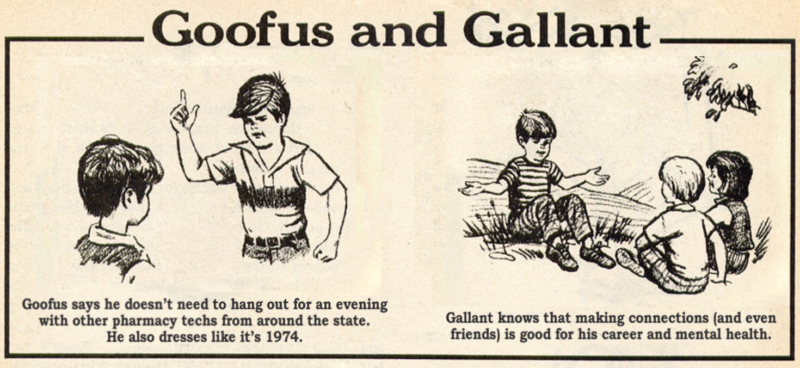Should you eat sand? Plus kids filling hospitals, seeing green for pain, and more
25 Oct 2022
Posted by Andrew Kantor
Seeing the world through green-color glasses
Wearing green glasses can make pain patients less anxious, and thus reduce their need for opioids and other pain killers.
Researchers at Duke Health found tested “special” green glasses (i.e., they’re a specific color of green) on patients with fibromyalgia and found they “were four times more likely to have reduced anxiety” than patients who wore blue or clear glasses.
They think this can apply to other causes of chronic pain, which would be kind of a big deal, as reducing anxiety can lead to reduced opioid use.
Have you registered for TechU yet?

Technicians — do not miss out on 2022’s biggest event just for you!
TechU 3.0 is coming fast — November 12 at the Sandy Springs Iron Hill Brewery.

One low price* gets you breakfast, lunch, 4 hours of CE, a professional headshot, and the chance to meet, greet, and connect with your kind in a evening of socializing, and education developed by pharmacy techs for pharmacy techs.
Click here or visit GPhA.org/techu for the details!
* Just $39 for GPhA members, $49 for non-members!
Flu + RSV + Covid = Hospitals filling with kids
While eyes were on the flu for a possible “twindemic” this fall, we let RSV slip under the radar. Now pediatric hospitals are filling up with sick kids thanks to a combo of flu, RSV (making an earlier-than-usual appearance), and a dash of Covid.
Peds wards nationwide are already at 71 percent of capacity, although obviously some areas are hit harder than others.
As one pediatrician said:
“[Various respiratory] viruses are all in play on top of SARS-CoV-2, and now the increasing amounts of influenza, which we had feared was coming in like a lion this year, has arrived.”
Georgia has the second-highest rate of flu in the country and remains in the middle of the pack for Covid; RSV cases have shot up since late August.
A story about an ad for a trial for a drug
There are movies, and there are trailers for movies. And there are occasionally trailers for trailers.
That in mind, Pfizer’s Biohaven has created an ad not for a drug, but for a trial of a drug. It’s looking for people with OCD to join its upcoming clinical trial of troriluzole*.
Why? One, to skirt rules that prohibit it from advertising a drug. (It can legally advertise a trial, though.) And two, to try to recruit people to participate, which is getting harder to do.
The weight is over
(aka, ranking anti-obesity drugs)
We could write 200 words about the problems of obesity, but instead we’ll just give you the latest top four weight-loss drugs from the American Gastroenterological Association:
- Semaglutide (Wegovy), weight loss percentage: 10.8%
- Phentermine-topiramate ER (Qsymia), weight loss percentage: 8.5%
- Liraglutide (Saxenda), weight loss percentage: 4.8%
- Naltrexone-Bupropion ER (Contrave), weight loss percentage: 3.0%
Lawsuit: Psilocybin should be C-II
In September, the DEA decided to keep psilocybin as a C-I drug (“high potential for abuse” with “no currently accepted medical use in treatment in the United States”).
But anyone who’s read the news knows there is potential for medical uses for psilocybin. Researchers, though, have a much harder time investigating C-I drugs.
Now one Seattle medical researcher is taking the DEA to court, asking the Ninth Circuit Court of Appeals to review that DEA decision, with a goal of having psilocybin reclassified to Schedule II.
That would relieve the “additional layer of administrative overhead” for research, while keeping it out of the hands of the people who might abuse it.
Coming soon on TikTok
Eat sand to lose weight. Well, very special sand — ‘engineered particles of porous silica’ that Aussie researchers found that their high surface area allows them “to soak up large amounts of digestive enzymes, fats, and sugars within the gastrointestinal tract.”
And, they say, it should be gentler on the stomach. How they know that is a good question, as the whole sand-vs-fat thing has only been shown in the lab; they haven’t even done animal tests yet.

Don’t do this. Yet.
Yet Another Ivermectin Study
I feel bad for the researchers from more than a dozen universities who just reported the results of their clinical trial: “These findings do not support the use of ivermectin in outpatients with mild to moderate Covid-19.” Yes, um, thank you. Their next project: Does saltwater quench thirst?
The next next Covid treatment
If not ivermectin, how about … mulberries? Sure, why not‽ Korean researchers found that kuwanon C, which comes from mulberries, prevents the SARS-CoV-2 spike protein from hooking up with the ACE2 receptor. [insert obvious metaphor here]
q



